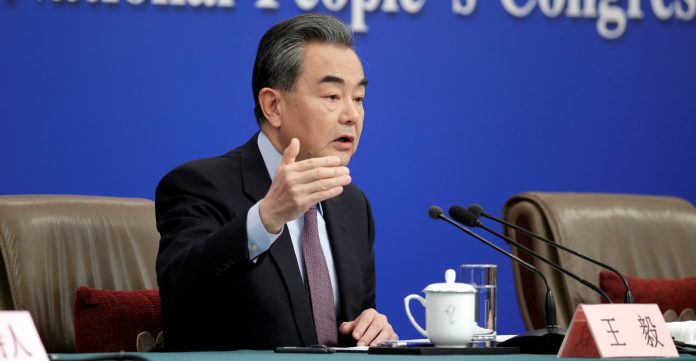- State Councilor Wang Yi says Chinese companies should use ‘legal weapons’ and not be ‘silent lambs’
BEIJING: The Chinese government’s top diplomat, State Councilor Wang Yi, said on Friday that China supports Huawei Technologies’ bid for legal redress in the United States, adding that Chinese companies should use “legal weapons” and not be “silent lambs”.
The Chinese telecoms equipment maker has sued the US government, saying a law limiting its US business was unconstitutional, as Washington has sought to counter what it sees as China’s growing threat to US economic competitiveness and security.
The lawsuit marks another rift between China and the United States, which spent most of 2018 slapping import tariffs on billions of dollars worth of each other’s goods.
In December, Huawei’s chief financial officer Meng Wanzhou was arrested in Canada at the United States’ request and faces possible extradition.
Speaking at a news conference on the sidelines of China’s annual meeting of parliament, Wang said recent actions aimed at certain people and companies were “deliberate political suppression” and that the Chinese government would take “all necessary measures” to safeguards their interests.
“At the same time, we support relevant companies and individuals to take up legal weapons to safeguard their rights and interests, and not be silent lambs,” Wang said.
“What we must protect today is not only a company’s rights and interests, but the legitimate development interests of a country and its people,” he said.
By contrast, foreign firms in China have long feared speaking out about unfair conditions, concerned they might be the target of political retribution and not have legal recourse due to the ruling Communist Party’s tight control of courts.
Huawei, a privately owned firm, has faced criticism around the world that it could be employed as an intelligence-gathering arm of the Chinese government.
It has embarked on a public relations and legal offensive as Washington lobbies allies to abandon its products when building 5G networks, centering on a 2017 Chinese law requiring companies cooperate with national intelligence work.
TOWARD CONFRONTATION?
Meng’s arrest quickly turned her into a central figure in a trade war between two economic superpowers.
To resolve the trade dispute, Washington has demanded that China make substantial changes to its laws and practices to protect US intellectual property, end forced transfers of US technology to Chinese firms, curb generous industrial subsidies and open the domestic market to US companies.
US President Donald Trump has said he would consider intervening in Meng’s case if it would help close a trade deal with China, and her lawyer has told a Canadian court that he has concerns the allegations against her have a political character, noting Trump’s comments.
But Huawei’s activities were under scrutiny by US authorities long before Trump initiated the trade war, according to interviews with 10 people familiar with the Huawei probes and documents related to the investigations.
People with knowledge of ongoing talks to end the trade war have said the two sides still have substantial work ahead to reach agreement on a way to ensure China follows through on any pledges. Negotiations still could collapse if a deal cannot be reached on enforcement of these “structural” issues.
Chinese industrial policies, including its state-backed Made in China 2025 plan to fund and promote sectors including robotics, aerospace, clean-energy cars, have provoked alarm in the West, and are core to Washington’s complaints.
But over the past year, Beijing has publicly downplayed that program, mindful of the backlash it had created. Once a key talking point for Chinese officials, former finance minister Lou Jiwei told the South China Morning Post on Wednesday the tech development strategy has been a “waste of taxpayers” money.
It was reported in June 2018 that mentions of the plan had dropped significantly in Chinese state media.
Foreign business groups have criticized the plan as large-scale import substitution, and experts doubt China will shelve such ambitions even if it takes a softer line in promoting them amid talks with Washington.
Answering a question on growing tensions between China and the United States, Wang said that “substantive progress” had been made in those trade talks.
“We believe China and the United States will not and should not move toward confrontation,” Wang said, adding that a way to resolve “any difficult issue” could be found so long as it was based on mutual respect.




